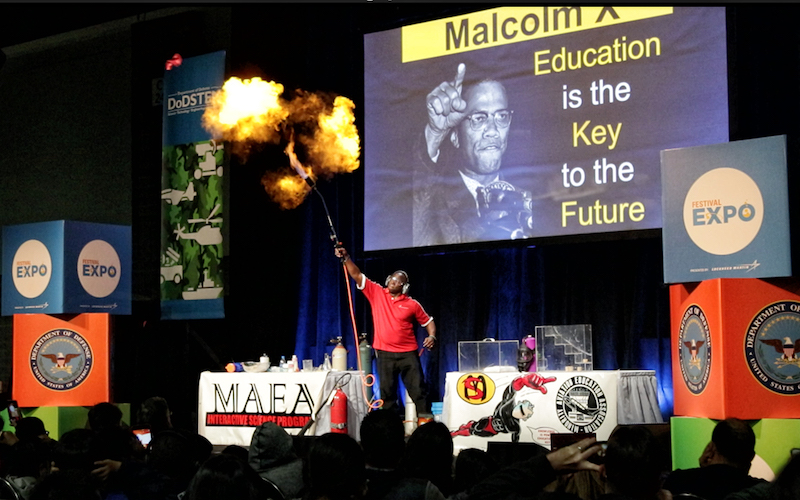Dr. Darryl Lee Baynes discusses the vitality of making education enticing for the next generation.
To Dr. Darryl Lee Baynes, education is much more than just repeating information from a book. It’s about telling a story. This is best seen in his live performances, which will commonly flow between interesting stories, facts, and even live (and often explosive) scientific experiments. President and Founder of Interactive Science Programs (ISP), Dr. Baynes has spread his focus to numerous events, such as the USA Science & Engineering Festival. We had the opportunity to discuss the future of STEM education with Dr. Baynes in this exclusive interview.
Innovation & Tech Today: Tell me a bit about Interactive Science Programs.
Dr. Darryl Lee Baynes: ISP is a division of the Minority Aviation Education Association, which is an organization my wife and I started in 1992 to get more kids interested in aviation and aviation-related careers. Then we expanded it. We expanded not just aviation, but we expanded to all the sciences. So we changed the name to Interactive Science Programs, which is more descriptive.
I&T Today: While you’ve been successful in your career at combining education and entertainment, “edutainment” isn’t always successful. Why do you believe that is?
Dr. Darryl Lee Baynes: For one, it’s how it’s put together. I don’t dumb things down for the kids. The content is just as strong as any other presentation, it’s just that I explain it a little different. And I meet the kids where they are. So a cryogenics program I do for elementary is different than a cryogenics program I do for middle school, which is different than a cryogenics program we do for high school, which is different than one I do for college. The slides might be the same, or I’ll skip some and focus on something different, depending on the grades, but the presentation is different because the expectations of what they should know should be different. I can use the same slides because they explain the same thing.
I&T Today: If you were to encounter a student who was really struggling to get into STEM education, what advice would you give them?
Dr. Darryl Lee Baynes: I’d talk to them about what they do every day. For example, everybody has ice cubes in their house. But if you go to a wedding, and you see an ice sculpture, the ice is crystal clear. Well, how did they make crystal clear ice? When you make ice it’s never crystal clear. So what I do is, we’ll buy ice cube trays. We’ll give ice cube trays to the kids, that way everybody has the exact same one. And I tell them that in order to make ice cubes that are crystal clear, you boil the water and let it cool down. Then I tell them to take it home, make some ice cubes, put them in a Ziploc, and bring them back in. So they’re going to take it home, they’ll make the ice cubes at night, and we’ll let it stay a whole day. Then we’ll count how many of what they started with came out crystal clear. Notice, I didn’t tell them how many times to boil the water and let it cool down. That way, we’re going to get variability. Some will boil it once or twice. Some will not boil it at all. Some, the really invested ones, will boil it ten, fifteen times.
So then, when you get your results, you make a graph. How many times did you boil? How many things did you see? See if you can get a correlation that you get more clear the more you boil. That is a simple, simple experiment that takes observation, that takes time. And then you can make mathematical data out of it when you’re done.
I think it’s a mistake to chase test results. There are school districts who pre-test their kids, who practice-test their kids, so they can do well on this one test. It’s ridiculous. Teach your kids how to think, and they can answer any question on any test.
I&T Today: That’s a really important lesson to teach, especially for this next generation.
Dr. Darryl Lee Baynes: One of the things I like doing is working with charter schools because charter schools are a little bit more independent. They can do whatever they want. So they don’t have to follow the state-mandated, “you have to teach this way, you have to teach that way.” You know what I mean? One of the things that I’m noticing is that schools, especially when it comes to science and math, because they don’t have as many science and math teachers that know what they’re doing, they tell them to teach a certain way. They’re taking the creativity out of being a teacher. The teachers are not being teachers. They’re being robots. And if you don’t like the way you’re teaching your kids, there’s nothing you can do about it, because it has to be taught this way because that’s what the school district says.
I&T Today: What do you most want people to take away from your presentations?
Dr. Darryl Lee Baynes: That science can be fun and it can be taught in a fun way. If teachers can teach in a fun way, then there’s less prevalence of teachers getting burned out.










